Serving up nutritious meals is a SNAP at library workshop series
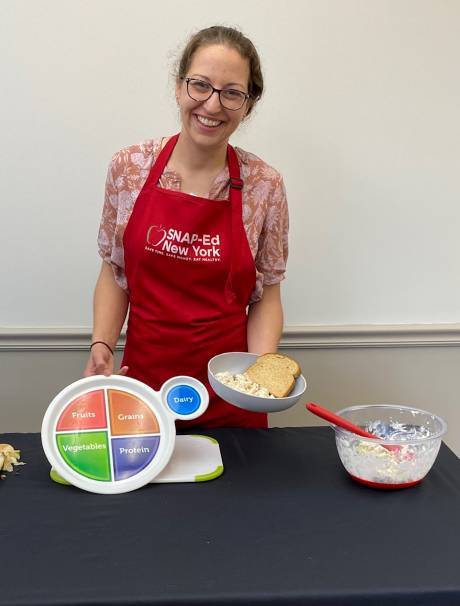
Sarah Martin is becoming a pro at talking, assembling, chopping, stirring and serving up nutritious lessons, along with a tasty edible, without missing a beat.
Martin is a SNAP-Ed nutritionist with Cornell Cooperative Extension. Her job got off to a slow start, thanks to all things COVID-19 a year ago, but then she was able to begin her monthly SNAP-Ed workshops in the fall.
“I’ll keep going as long as there’s interest,” she said during an interview Friday at her Batavia office. “The information we provide is general, healthy information. There’s a lot of misinformation out there, and we use evidence-based curriculums.”
Her next workshop is set for 6 p.m. June 7 at Richmond Memorial Library, 19 Ross St., Batavia.
It will focus on the My Plate concept of filling about half your plate with fruits and vegetables, about a quarter of it for protein and another quarter grains, with a small dollop of dairy. Out of everything her lessons might include, she emphasizes grains, with a goal to make at least half of your grains whole grains, she said.
"I'm going to talk about the MyPlate, so I'm going to discuss the five food groups," she said. "And just talk about kind of balancing those groups and good ways to incorporate foods from each group and why it's important to eat all five groups."
Flash Quiz: What is the best way to know that the bread you are buying is a whole-grain product?
If you think that bread labeled with the words "multi-grain," "stone-ground," "100 percent wheat," "cracked wheat," "seven-grain," or "bran" fit the bill, the buzzer just went off. These loaves of bread are usually not whole-grain products, Martin said. Look for the word "whole" in the ingredient list.
There are three parts of a grain, and eating them whole means including each component that provides fiber, iron, B vitamins and other nutrients, she said. Those foods include oats, whole wheat products and brown rice. The other types of grain foods are processed, which removes those good nutrients and fiber, such as in white breads and pastas. She has plenty of information to share just about grains alone.
“We have a whole class on it,” Martin said.
SNAP stands for Supplemental Nutrition Assistance Program, and SNAP-Ed is a nutrition education program for those income-eligible folks that use SNAP benefits for food purchases. Grant-funded by the USDA, the program allows staff to provide nutrition education to primarily underserved communities, she said. That education might be taught at libraries, schools, clinics, and community centers while other types of work focus on policies, the environment, school wellness and fruit and vegetable "prescription" programs, she said.
“The beauty of SNAP-Ed is that with a lot of fad diets they tend to radicalize the diet,” Martin said. “What can you add to those things to really bump up the nutrition? So we're not trying to really overhaul anything, we're just trying to make sure everyone's informed, and to share discussion space on how to add nutrition to the day. For each individual group of nutrients, what are the ways you can eat those foods? So for vegetables, we go through a list of vegetables, some common foods, and list the fiber, vitamins and minerals.”
Speaking of vegetables, are beans, peas and lentils part of this food category? Actually, they can be counted in two groups: protein and vegetables, she said.
Flash Quiz: What color vegetable should you eat the most?
This is a trick question, Martin said, since varying your veggies ensures you get many different vitamins and minerals. Aim for what’s called a Rainbow Plate, she said, filled with an assortment of colors, such as carrots, broccoli and red peppers.
“A rainbow plate is full of colors, which indicate various levels of nutrients,” she said.
“Usually I'll present on a topic, but I try to make it a little more discussion. I invite everyone to chime in and ask questions. We make it a little bit of a discussion about what's your food experience? Where do you see the least foods being used or not? I try to keep it very engaging and interactive, we do sometimes bring in activities.”
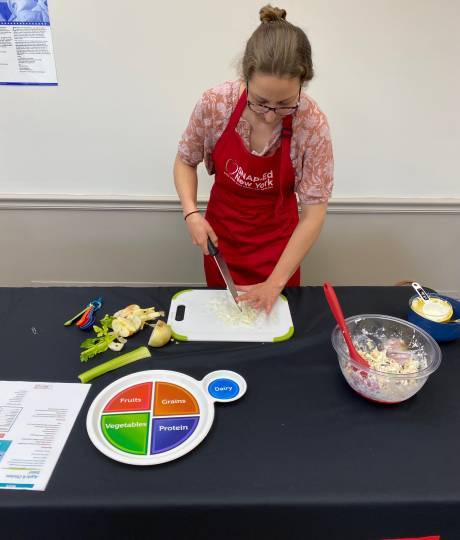
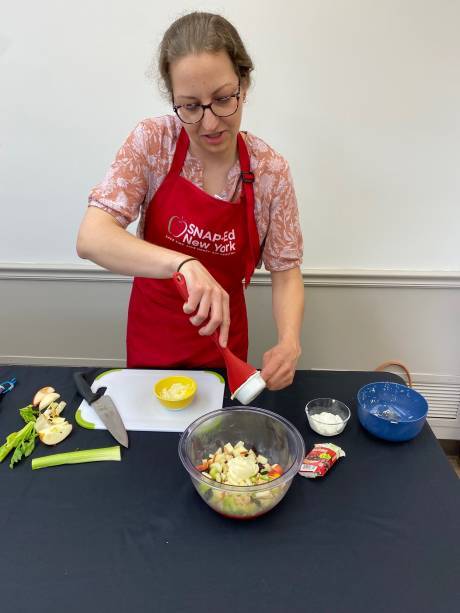
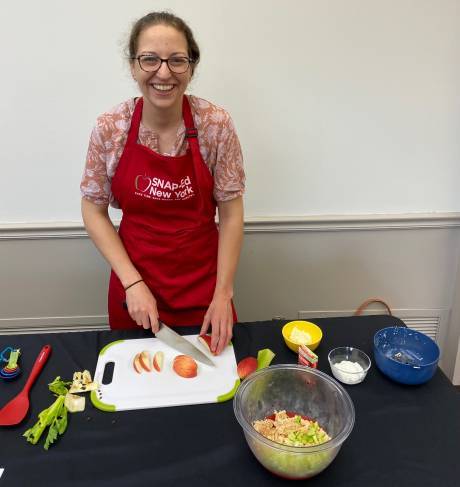
Martin demonstrated how she might lead a class and walk members through a recipe. She made a chicken salad and laid out all of the ingredients, followed by chopping the celery, onion and apple. She then mixed in a mayo-Greek yogurt combination and seasonings. At the end, participants will get a sampling of the final dish. The recipe included multiple food groups, she said, of fruit, vegetables, protein, dairy, fat, and grain with an added slice of toasted whole wheat bread.
Another part of the education is to inform people about opportunities such as farmers' market programs; places where participants can use their SNAP dollars or stretch their food dollars, she said.
Melissa Kimbrell is Cooperative Extension’s regional coordinator, and she oversees grants and statistics-related details, such as the results of surveys after a workshop. She tries to gauge if people walked away with something they didn’t know when the talk began. And, perhaps most importantly, did they intend to incorporate some new food — 100 percent whole wheat, for example — or behavior to their lifestyle.
"The beautiful thing … is about working the food demonstrations into our classes,” Kimbrell said. “Our entire website focuses on recipes that have fewer ingredients, they're not cumbersome to make; they're fairly easy and straightforward. It really tries to prioritize nutrition and follow that sort of My Plate methodology that we're talking about, as far as how to approach your plate.”
She doesn’t just talk about that concept, but often follows it by visiting the website for recipes, she said.
“I use it all the time in my personal life, because it's just a one-stop-shop for easy, low-cost recipes that I know are nourishing.,” Kimbrell said.
These talks are given in areas that have people experiencing poverty, are underserved and where at least 50 percent of children qualify for the free or reduced school lunch program, she said.
“Because we believe that nutrition education and these types of services should be available to everyone regardless of socio-economic status,” she said. “So it's the way that we sort of strategically get ourselves into the community and where we hold the classes, that sort of dictates the target audience piece of it.”
That being said, no one is removed from a workshop or is required to show any type of proof as a SNAP recipient, she said.
Some popular topics have been how to understand food labels and ingredient lists better; making swaps for recipes when one doesn’t have or like one or more of the ingredients; how to add exercise to an otherwise sedentary lifestyle; and finding the hidden sugars in the myriad of foods and beverages.
“People are consuming so much sugar and calories through what they drink. And it really throws off the balance to the nutrition for their day. So we do have content where we try to really bring awareness to sugary beverages and the role they play, and also awareness to how much sugar is in these sort of casual things that we drink that we don't necessarily think have sugar in them,” Kimbrell said. “So another big goal of ours is to reduce the sugary beverage consumption and getting people to choose water, low-fat dairy, things like that, more often.”
“The feedback that we get from people is, I've had people tell me, ‘oh, you know, I switched from chocolate milk to white milk,' after we did a lesson on sugar, or I'm drinking more water now or I'm eating my veggies. That's what makes me smile,” she said.
Kimbrell admitted that she has struggled with reducing her pop consumption in trade for more water. But she has also learned ways to eliminate those 12 teaspoons of sugar per small bottle of cola, such as drinking noncaloric flavored seltzer.
These talks aren’t about hitting someone over the head with suggestions, but about providing information and facts so that people can make an informed decision, Martin said.
“We do leave that choice up to the person,” she said. “It's to help clarify, because there is a lot of information out there and misinformation. So I think it's to clarify what the science is saying about what good nutrition looks like. It's to maybe help with a healthy way of thinking about food. So, you know, food isn't just calories. Food is something that we share with our family and our friends. It's about trying to maybe make food a little more friendly.”
No registration is required for the monthly workshops, and they are free. For more information, go to:
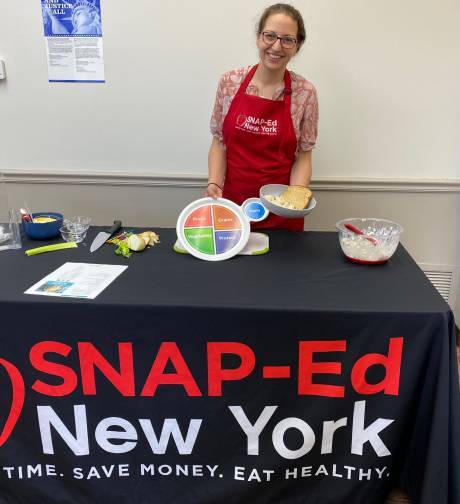
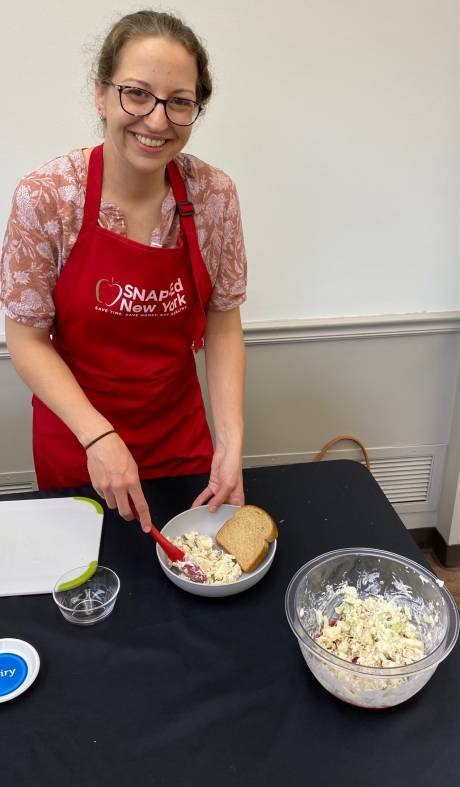
Top photo: Sarah Martin, a SNAP-Ed nutritionist with Cornell Cooperative Extension, gives monthly talks that include a food demonstration the first Tuesday of each month at Richmond Memorial Library in Batavia. Sarah Martin leads her way through a recipe of chicken salad, offering tips and reminders about being sanitary, using safe knife skills, being prepared and how to substitute ingredients when needed. Her next workshop, about My Plate and the five food groups, is at 6 p.m. June 7 at Richmond Memorial Library, 19 Ross St., Batavia. Photos by Joanne Beck
